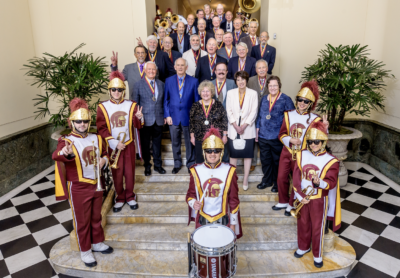Alumnus Stan Hajduk, MD (Class of 1968), was among a new breed of medical students who didn’t come from wealth or a lineage of doctors, but from a blue-collar working family. Scholarships enabled him to attend KSOM and to ultimately have a 50-year career as a leading community health advocate in Central California. Because of his experience at the Keck School, he led a life dedicated to medical service and social justice.
 When Stan passed away, his classmates created a scholarship to enable aspiring doctors like Stan to pursue these same ideals.
When Stan passed away, his classmates created a scholarship to enable aspiring doctors like Stan to pursue these same ideals. Third-year student Carlos Castellanos has been the recipient of the scholarship since its inception, and he is already carrying on Stan’s legacy of service at Keck and beyond. Carlos grew up in San Diego. His mother and father immigrated from Portugal and Mexico, respectively.
Living near the Mexican-American border was a unique experience that echoed the union of different cultures and values in Carlos’ home. Growing up, he lived modestly. According to Carlos, his wealth came in the form of packed living rooms and dining tables, filled with friends and family. Carlos attended Johns Hopkins University, where he obtained a B.S. in neuroscience and a master’s degree in biochemistry and molecular biology. During his gap years, he returned home to begin working in the Department of Pediatrics at UC San Diego. For two years, he generated toxicity and efficacy data supporting a stem cell gene therapy for cystinosis, a rare metabolic disease. Carlos chose to study medicine at the Keck School of Medicine, in part, because he found the opportunity to serve the Hispanic population that he grew up with indispensable. Just like Stan, scholarships enabled Carlos to attend Keck.
The Class of 1968 and Carlos got together on Zoom recently to celebrate Stan, Keck, and the tradition of medical service and social justice. They discussed the parallels between 1968 and 2020/2021. When the class graduated in 1968, protests raged against the Vietnam war, President Johnson signed the Civil Rights Act into law, and Martin Luther King, Jr., was assassinated. 1968 was a turning point in U.S. history, and this past year (with a global pandemic, deep political divides, and remote work and school) seems to be equally influential.